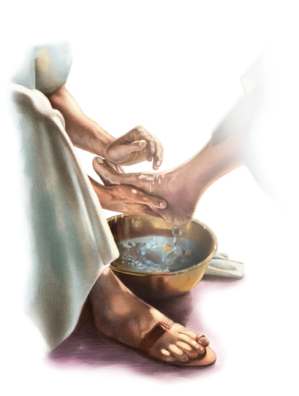Servant Leadership
 The notion of leadership recently came up in discussion and the question was asked: What qualities make for a good leader?
The notion of leadership recently came up in discussion and the question was asked: What qualities make for a good leader?
If you go into a secular bookshop today you will find a large number of books which attempt to explain what it is you have to do in order to become a great leader.
In recent years, Christian bookshop shelves too have started to be filled with an increasingly large number of books which try to turn their readers into leaders by explaining the “eight key leadership principles” or the “five simple steps”, etc.
Like Father, Like Son…
The first passage of Scripture which comes to my mind when someone mentions to me the word “leadership” is from the Old Testament book of 1st Kings. In this passage, King Solomon has just died and his son Rehoboam has ascended to the Throne of David.
Now, towards the end of his life, Solomon’s “heart was not fully devoted to the LORD his God, as the heart of David his father had been” (1 Kings 11:5). He took foreign wives who “turned his heart after other gods”. Solomon, who had once been known among the nations for his wisdom became a tyrant and placed an increasingly heavy burden upon his people.
When Rehoboam became king, the whole assembly of Israel came to him and asked him to lighten the burden which his father had placed upon them. Rehoboam asks for time to consider their request. He then consulted the elders who give him the best piece of advice he would ever hear:
“If today you will be a servant to these people and serve them and give them a favorable answer, they will always be your servants” – 1 Kings 12:7
This was the essence of the elder’s advice: serve the people and they will always serve you. Rehoboam then sought the advice of the young men, his peers. They gave him totally contrasting advice, telling him to tell the people:
“My little finger is thicker than my father’s waist. My father laid on you a heavy yoke; I will make it even heavier. My father scourged you with whips; I will scourge you with scorpions.” – 1 Kings 12:10
Unfortunately, Rehoboam rejected the advice of the wise elders and took the foolish advice of the young, refusing to “[be] a servant to [his] people”. So began the disintegration of the United Monarchy of Israel, the rebellion and ultimate separation of the ten northern tribes:
Serving Soles
This epitome of servant-leadership is presented to us in the New Testament in the person Jesus, our example par excellence. In the course of the Last Supper, Jesus got up from the table and began to wash his disciples’ feet:
 …When he had finished washing their feet, he put on his clothes and returned to his place. “Do you understand what I have done for you?” he asked them. “You call me ‘Teacher’ and ‘Lord,’ and rightly so, for that is what I am. Now that I, your Lord and Teacher, have washed your feet, you also should wash one another’s feet. I have set you an example that you should do as I have done for you. Very truly I tell you, no servant is greater than his master, nor is a messenger greater than the one who sent him. Now that you know these things, you will be blessed if you do them – John 13:12-1
…When he had finished washing their feet, he put on his clothes and returned to his place. “Do you understand what I have done for you?” he asked them. “You call me ‘Teacher’ and ‘Lord,’ and rightly so, for that is what I am. Now that I, your Lord and Teacher, have washed your feet, you also should wash one another’s feet. I have set you an example that you should do as I have done for you. Very truly I tell you, no servant is greater than his master, nor is a messenger greater than the one who sent him. Now that you know these things, you will be blessed if you do them – John 13:12-1
It really isn’t a particularly pleasant task to wash the dirt and sweat off someone’s feet and in 1st Century Palestine foot washing wasn’t ceremonial – it was very practical. People walked around in sandals through streets which were dirty, dusty and full of animals and “waste”. The towel that Jesus wrapped around his waist would have been quite filthy after cleaning twenty-four dirty feet.
In this era, a person would normally wash his own feet, but sometimes they would be washed for him by a very lowly servant. However, it was considered a job so humiliating that an Israelite slave could not be commanded to perform it. Yet this is exactly what Jesus does voluntarily…
It is hard to comprehend the magnitude of the act of service Jesus offered His disciples that evening. Jesus was their teacher, a holy man, their Lord, the Christ, the Son of God no less! Yet, here He was, getting down on His hands and knees and washing the feet of twelve men…even the feet of the man who, He knew, would shortly betray Him.
I believe that in this act, Jesus showed us the true character of Christian discipleship. To be a Christian means to imitate Christ and in this passage Jesus gives us a very clear example to follow.
“[Our] sharing in the kingly mission of the Lord means joining an army of foot-washers. While our society teaches us to race to the top, in Christ’s kingdom the race is to the bottom” – Marcellino D’Ambrosio
I think it is particularly significant that He gave this example to the Apostles, those who were to lead the Church and exercise His tremendous authority after the Ascension. In washing their feet, Jesus set the standard for leadership in His Church:
To lead…is to serve.
I’m reminded of Pope Gregory the Great when he received a letter from a Patriarch where two-thirds of the letter was taken up listing the Patriarch’s titles. Gregory simply responded with the title describing himself as “Servant of the servants of God”, a common title later used by the Popes.
It is quite sad and ironic that in Luke’s Gospel account of that same meal, we hear that an argument broke out among the disciples. It was their favourite, long-running argument…which of them was the greatest? (Luke 22:24-30). It would be some time yet before they would truly take the Lord’s teaching to heart:
“Anyone who wants to be first must be the very last, and the servant of all” – Mark 9:35

well said my friend. it seems all too often we take leadership as an excuse to be served or a confirmation of our superiority instead of seeing it as a responsibility to lay down our lives for those to whom we’ve been called.